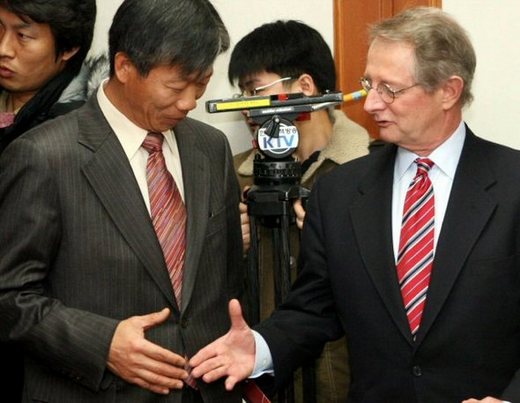 |
|
A Korean delegate try to shake hands with his American counterpart before a talk on U.S. beef in Seoul on January 9, this year.
|
Critics say Korea is not strict on U.S. beef, back after ban
South Korea has resumed imports of U.S. beef after a 34-month ban. However, consumers remain concerned about their safety, calling the government’s importation standards inadequate. Critics are using as their basis for comparison the stricter standards imposed by Japan, which lifted its 25-month ban on U.S. beef imports December last year. South Korea and Japan used to be two of the largest markets for U.S. beef, with the former importing 200,000 tons in 2003 and the latter 250,000 tons the same year. At that time, Japan and Korea imposed the same import conditions on U.S. beef, but upon restarting imports the two countries’ standards have diverged. South Korea is now importing meat from U.S. cattle less than 30 months old, but Japan is allowing only the meat from cattle aged 20 months or younger. There has been no case of mad cow disease within the past 20 months, but the 30-month duration has seen 21 cases in Britain and Japan. There is strong evidence that eating meat contaminated with mad cow disease, or bovine spongiform encephalopathy, may cause a similar disease in humans, according to the U.S. Center for Disease Control and Prevention. The disease in both species is a degenerative brain condition with no known cure. It is "invariably fatal," the center’s web site reports.Citing guidelines suggested by the World Organization for Animal Health, better known as the OIE, the Korean government says that the meat to be imported is "safe." But the OIE has recently been lowering its safety standards regarding beef imports. In May last year, the OIE removed a regulation which stipulated that a country could ban imports of beef aged less than 30 months old from countries in which mad cow disease was found. The OIE also eased restrictions by allowing the trade of meat from cattle aged 30 months or younger, regardless of the occurrence of the disease in that country’s livestock supply. It is not clear why the OIE has consistently lowered its safety standards regarding beef imports, though some suspect industry pressure. Japan has not adjusted its standards to match the newly-lowered regulations of the OIE, instead choosing to implement its own system. South Korea’s relaxation of its regulations also coincide with U.S. pressure to lift the beef ban in order to open up free trade negotiations between the two countries. Those negotiations began February this year. Japan came to an agreement with the U.S. to import meat from cattle less than 20 months old, citing reports that the mad cow disease pathogen has been found in some of the meat from cattle less than 30 months old. It also lowered the age ceiling to 12 months from 17 months for meat without no birth records, calling the U.S. method of checking a cattle’s teeth to determine its age "unscientific." South Korea, on the other hand, took no issue with the "tooth exam" method. Experts have problems with this scenario. "There is no guarantee to saying a cow is aged 30 months or older by examining its teeth, since their shape could differ according to type of cow and the foods it eats," a veterinarian said. Cattle aged more than 20 months are slaughtered in Japan whenever a new case of mad cow disease is found, a strict regulation system that the Korean government said gave Japan more leverage in their negotiations with the U.S. on restarting imports. However, during negotiations with the U.S., Seoul reportedly failed to use to its advantage the fact that no mad cow disease has yet been found in South Korea. MAKE SURE THIS PARAGRAPH MATCHES THE WRITERS’ MEANING The government has not [revealed the contents of its negotiations]?TRUE with the U.S. concerning the resumption of the beef imports, and has made little effort to gather public consensus. Japan, by contrast, has been active in gathering public opinion and disclosing details of its negotiations on government web sites. "The government needs to hold talks again with the U.S. and strengthen standards for importing beef, [in a manner] not bound by the free trade talks," said Woo Hee-jong, a professor of the college of veterinary medicine at Seoul National University.






